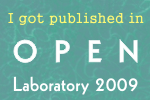Mozilla Science Labs are looking top pair programmers and scientists. If you are a scientist in need of a programmer, read the following, and then go to the website to see how to take it further. Thanks to Miami University’s Office for Advancement of Research and Scholarship for bringing this to my attention. Interdisciplinary Programming is […]
Yesterday I received an email from Kristjan Liiva, a student at RWTH Aachen University Germany. Kristjan has developed a really cool dashboard to analyze and visualize the development of collaborative OSS projects by mining their mailing lists and software repositories. (If the link doesn’t work, try again later; the project is heavily under development). The […]
So there was a lot written over the blogosphere, twittersphere and what-have-you-sphere about the to publish code in scientific research. The latest volley was fired from a post at biostars.org from “JermDemo” which also mentioned my post on making accountable research software by forming a volunteer “Bioinformatics Testing Consortium”. (My post, not my idea). I won’t […]
So there have been a few reactions to my latest post on accountable research software, including a Tweeter kerfuffle (again). Ever notice how people come out really aggressive on Twitter? Must the the necessity to compress ideas into 140chars. You can’t just write “Interesting point you make there, sir. Don’t you think that your laudable goal would […]
Preamble: this post is inspired by a series of tweets that took place over the past couple of days. I am indebted to Luis Pedro Coelho (@LuisPedroCoelho) and to Robert Buels (@rbuels) for a stimulating, 140-char-at-a-time discussion. Finally, my thanks (and yours, hopefully) to Ben Temperton for initiating the Bioinformatics Testing Consortium. Science is messing around with […]
Some time ago an article in Linux Journal discussed the adoption of free/open course software (FOSS) by the general public. The article (I can’t seem to find it now) talked about the people that do not care about the distinction between Free as in Free Beer vs. Free as in Freedom (libre). They want software […]
The 11th Annual Bioinformatics Open Source Conference (BOSC) 2010 is coming up in Boston, July 9-10 2010. The BOSC meetings are a great get-together of a community of programmers who are like-minded in their advocacy of open source code for science, and specifically for bioinformatics. The whole thing is run by volunteers who take a […]
In no particular order or context. No personal stuff and by no means a complete list: WordPress (like, duh). Wikipedia (default for looking up new stuff) Wikis in general (great lab management tool. Don’t need LIMS) Open Access Publishing and Creative Commons licensing. FLOSS licensing (90% of the software I use, and 100% of what […]
Warren DeLano passed away suddenly and at a young age at his home Nov 3, 2009. He was the author of PyMol, a very popular molecular visualization program, and a strong advocate of open source software. The family of Warren Lyford DeLano has created a “In Memorium” page and blog. Also, a memorial award is […]
Open Notebook What is it? Open Notebook means “no insider information” You lab notebook is on a wiki, out there for everyone to see. Negative results & all. You share your research process with the world as you go along. There are many shades to this process: you may share some of your data, edit […]
Beware the temptation to use the 45 and 120 degree angle pink and yellow light source, in combination with shiny plastic B-splines, which would make your protein model look like brothel decor
March 14 is also the anniversary of the release of Linux kernel 1.0, with all of its 176,250 lines of code. The current 2.6.28 has crossed the 10,000,000 threshold. Tux should have a birthday Pi…. but here is some other Tux confectionery:
Biopython is entering its 10th year; the unofficial birthday is on September, since that is when the mailing list started: September 1999. I stumbled onto that list mid-September, 1999. I believe the Python version was 1.5, I was still working on SGI Irix, and I was an 0.3 PhD candidate. Today I am coding with […]
Maybe I am slow on the uptake, but I never quite liked the term “post genomic”, and I used it very sparingly. (Yes, I do have that term in one of my better cited papers, smack in the first sentence of the abstract, but I never liked that). Perhaps because of all the associated abuse […]
(Continued from “On Microbial Sequencing“). Well, it’s really been a great meeting. The biology of pathogens, parasites and symbionts is amazing. Historically, the microbes that chiefly interested us were one of those three: those that causes disease in humans, animals (focus on domesticated animals), plants (again, mostly domesticated). However, as we are (alas, too slowly) […]





